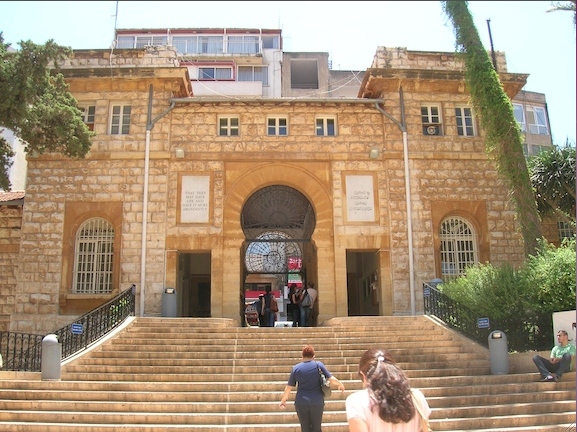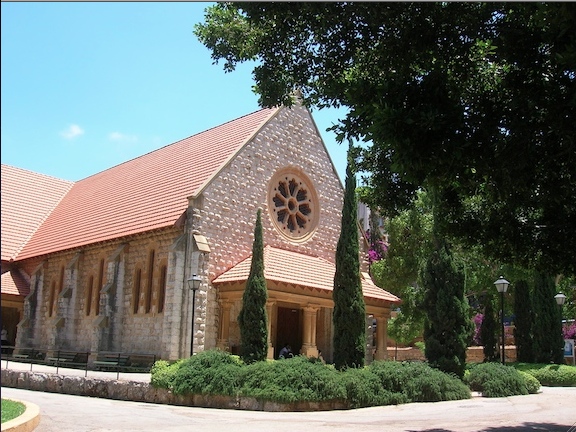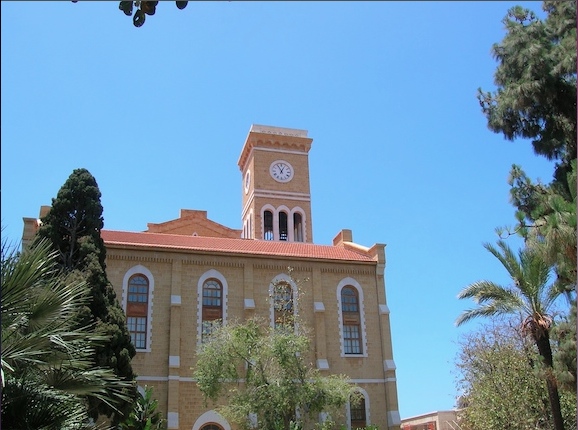Betty S. Anderson, The American University of Beirut: Arab Nationalism and Liberal Education. Austin: University of Texas Press, 2011.
Jadaliyya (J): What made you write this book?
Betty S. Anderson (BSA): I always joke that I conceived the project in the pool of the Carlton Hotel in Beirut. In June 2000, I visited Beirut for the first time so I could attend an Arab American University Graduate (AAUG) conference. One day, I walked with some friends all along the Corniche and up through the American University of Beirut (AUB) campus and then back to the hotel. Since it was late June and ridiculously hot, the only option at that point was to jump in the pool as quickly as possible. Two minutes in the pool and the thought occurred to me that my next research project was going to have to be about Beirut in some way. I had fallen in love with the city in just that one day. A half second later, I thought, I should write a history of AUB.
Besides the fact that I wanted to get back to Beirut as soon as possible, I wanted to know why AUB had been so influential in politicizing its students. At the time, I was doing additional research for my book on Jordan (Nationalist Voices in Jordan: The Street and the State) and a number of the political activists I studied had attended AUB. Their memoirs were filled with explanations and stories about how important those four years were for the development of their political identities. However, I had no idea as I floated in the pool that day that I’d have to do extensive research on Protestant missionaries and education long before I could even get to those Arab nationalists. At the time, I really knew relatively little about the school’s history.
J: What particular topics, issues, and literatures does it address?
BSA: When I finally got back to Beirut in 2004, it was research on the educational systems offered at the Syrian Protestant College and AUB that eventually ended up directing my thesis. I was struck initially by the goals the American founders and their successors set for the school. They talked more about the transformative process they wanted the students to undertake than the course options they were offering. For example, Daniel Bliss (1866-1902) preached about producing Protestants who understood not only the liturgy but the lifestyle required of one converting to this faith; Bayard Dodge (1923-1948) exhorted students to follow the model of the modern American man as they sought to develop new characters for themselves. The former presided over a missionary educational system, the latter the new liberal education system then being formulated back in America. The first half of the book discusses this shift as the American University of Beirut was renamed in 1920.

[Main gate of AUB campus. Photo by Betty S. Anderson.]
Liberal education, as American educators developed it in the second half of the nineteenth century, asks its students to be active participants in their educational experience. Before this point, professors taught their students a fixed body of knowledge; students were required to memorize and recite the data to prove that they had learned it. In liberal education, the system asks that professors teach students how to think and analyze so they can produce data on their own.
The second half of the book examines how the students reacted to this shifting pedagogical focus. The American leaders of the school repeatedly stated their goals for the students, and most books and articles on AUB focus on only those voices. However, that stance leaves out an important element of the AUB story, because only the students can truly determine whether the programs are effective. AUB is famous for the many student protests that have taken place on campus, starting with the Darwin Affair of 1882, leading to the Muslim Controversy of 1909, and then on to the large protests of the 1950s, 1960s, and 1970s. As I discovered when I delved into the archives, students used dozens of newspapers to explain why they were protesting. The catalyst was always a particular event, on campus or off, but the students always framed their arguments around the freedom they felt the liberal education system promised. They fought against any administrative attempts to curtail their actions and frequently accused the administration of not following the guidelines set by American liberal education. This issue became increasingly contentious as students worked to define an Arab nationalism that called on them to be politically active while on campus. The administration continually opposed this position, and many of the student-administrative conflicts centered on the differing definitions of freedom put forward on campus. I put “Arab Nationalism and Liberal Education” in the subtitle of the book because by the twentieth century, these were the two dominant elements defining the relationship between the students and the administration.
J: How does this work connect to and/or depart from your previous research and writing?
BSA: Most of my work has centered on education in one form or another. In my book on Jordan, I wrote of the politicizing role high schools in Jordan and Palestine, as well as schools like AUB, played in mobilizing a national opposition movement in the 1950s. I have published a number of articles analyzing the narratives the Jordanian and Lebanese states present to their students in history and Islamic textbooks. Moving on to a comprehensive study of one particularly influential school was a natural progression. The difference was that I now had to study American education in the same way I had previously examined the influence of education in the Middle East.
J: Who do you hope will read this book, and what sort of impact would you like it to have?
BSA: I hope AUB alumni want to read the book and, equally, that they find something of their story in it. I did not want to cite just the Americans who founded and ran the school; I purposely wanted to write about the students themselves. Typical university histories leave out the words and actions of the students in favor of hagiographies about the founders and their famous successors. I also hope that scholars and students interested in studies of education and nationalism will be interested. This is a book that addresses both Middle Eastern and American studies.


[Assembly Hall and College Hall, AUB Campus. Photos by Betty S. Anderson.]
J: What other projects are you working on now?
BSA: I have a contract with Stanford University Press to publish a book called State and Society in the Modern Middle East. Like with anyone who undertakes to write a textbook, I am frustrated with those that are currently available. Textbooks of the modern Middle East typically focus just on state formation, the actions of the chief politicians, and the political interplay between states. My text focuses instead on the relationship between state and society as it developed over the last two hundred years. The states in the region centralized in the nineteenth century, faced colonialism in the early twentieth century, and then independence after World War II; these stages created new roles for state leaders. Civil society, in the broadest definition of the term, emerged from the eighteenth century forward as people sought new ways to organize within and against the states now intruding on their lives. They took advantage of the new institutions the states built to establish for themselves new class, national, and gender definitions, while frequently opposing the states that had introduced these very institutions. My text examines how schools, government offices, newspapers, political parties, and women’s groups constantly negotiated new relationships with their respective states.
Excerpt from The American University of Beirut: Arab Nationalism and Liberal Education
From Chapter One:
"The great value of education does not consist in the accepting this and that to be true but it consists in proving this and that to be true," declared Daniel Bliss, founder of Syrian Protestant College (SPC; 1866–1920) and its president from 1866 to 1902, in his farewell address. President Howard Bliss (president, 1902–1920) said in his baccalaureate sermon in 1911, "In a word, the purpose of the College is not to produce singly or chiefly men who are doctors, men who are pharmacists, men who are merchants, men who are preachers, teachers, lawyers, editors, statesmen; but it is the purpose of the College to produce doctors who are men, pharmacists who are men, merchants who are men, preachers, teachers, lawyers, editors, statesmen who are men." Bayard Dodge (1923–1948) stated at his inauguration as president of the newly renamed American University of Beirut (AUB; 1920– ), "We do not attempt to force a student to absorb a definite quantity of knowledge, but we strive to teach him how to study. We do not pretend to give a complete course of instruction in four or five years, but rather to encourage the habit of study, as a foundation for an education as long as life itself." The successors to these men picked up the same themes when they elaborated on the school`s goals over the years; most recently, in May 2009, President Peter Dorman discussed his vision of AUB’s role. "AUB thrives today in much different form than our missionary founders would have envisioned, but nonetheless—after all this time—it remains dedicated to the same ideal of producing enlightened and visionary leaders."
In dozens of publications, SPC and AUB students have also asserted a vision of the transformative role the school should have on their lives. The longest surviving Arab society on campus, al-`Urwa al-Wuthqa, published a magazine of the same name during most academic years between 1923 and 1954 and as of 1936 stated as its editorial policy the belief that "the magazine`s writing is synonymous with the Arab student struggle in the university." From that point forward, the editors frequently listed the society`s Arab nationalist goals. In the fall 1950 edition, for example, al-`Urwa al-Wuthqa`s Committee on Broadcasting and Publications issued a statement identifying the achievement of Arab unity as the most important goal because "it is impossible to separate the history, literature and scientific inheritance of the Arabs" since "the Arab essence is unity." Toward this end, al-`Urwa al-Wuthqa pledged to accelerate the "growth of the true nationalist spirit" among the students affiliated with the organization. In describing education as an activist pursuit, the statement declares, "To achieve political ideas which are aimed at our nationalism it is necessary for we as students to seek information by many different means." In this call, the AUB Arab students must take on the task of studying the Arab heritage as thoroughly and frankly as possible so that when they graduate they can move into society with solutions to the many problems plaguing the Arab world.
Since the school`s founding in 1866, its campus has stood at a vital intersection between a rapidly changing American missionary and educational project to the Middle East and a dynamic quest for Arab national identity and empowerment. As the presidential quotes indicate, the Syrian Protestant College and the American University of Beirut imported American educational systems championing character building as their foremost goal. Proponents of these programs hewed to the belief that American educational systems were the perfect tools for encouraging students to reform themselves and improve their societies; the programs do not merely supply professional skills but educate the whole person. As the quotes from al-`Urwa al-Wuthqa attest, Arab society pressured the students to change as well. The Arab nahda, or awakening, of the late nineteenth and early twentieth centuries called on students to take pride in their Arab past and to work to recreate themselves as modern leaders of their society; the Arab nationalist movement of the twentieth century asked that students take a lead in fighting for Arab independence from foreign control. The students streaming through the Main Gate year after year used both of these American and Arab elements to help make the school not only an American institution but also one of the Arab world and of Beirut, as the very name, the American University of Beirut, indicates. This process saw long periods of accommodation between the American-led administration and the Arab students, but just as many eras when conflict raged over the nature of authority each should wield on campus; the changing relationship between the administration and the students serves as the cornerstone of this book, for it is here where much of the educational history of SPC and AUB has been written.
From Chapter Five:
The 1952 April Fool’s Day issue of Outlook (called Lookout on that day) satirized the proliferation of student protests that had dominated campus life for the previous few years. In the paper’s lead article, the author declared, “A School of Revolutionary Government, designed to equip AUB students with a wide knowledge of modern techniques of conspiracy and revolution, is to be opened during the fall semester, a communique from the President’s Office announced late Friday.” Continuing the same theme, the article reports, “All courses will include a minimum of three lab hours to be spent in street battles with gendarmes and similar applications of theories learned in classrooms.” President Stephen Penrose (1948-1954), the article stated, gave a Friday morning chapel talk on the new school motto: “That they may have strife and have it more abundantly.” In a further announcement, the paper described the day’s protest.
There will be a demonstration this afternoon at three in front of the Medical Gate to object against everything[.] All those interested please report there promptly five [minutes] before time. The demonstration promises to be very exciting—tear gas will be used, and the slogans are simply delightful. If all goes well, police interference is expected. If not to join, come and watch.
This, of course, had not been the first era of student protest; the difference by the 1950s was the widespread and sustained nature of the conflict between the administration and the students. When Lookout published its satirical articles in 1952, students had been organizing demonstrations in support of Palestinians and Moroccans, and against any and all things imperialist, since 1947; these events only petered out in 1955 as the administration banned the two main groups organizing them, the Student Council and the Arab society, al-cUrwa al-Wuthqa. Students engaged in these exercises explicitly as Arabs, proud of their past, and striving toward cultural, political and economic unity in the future. In their actions, students sought to integrate their educational experiences at AUB with the real-life events taking place outside the Main Gate, for only then did they feel they could be trained to function as the vanguard initiating the necessary changes in their society.
[Excerpted from Betty S. Anderson, The American University of Beirut: Arab Nationalism and Liberal Education. © 2011 by The University of Texas Press. Excerpted by permission of the author. For more information, or to order the book, click here.]